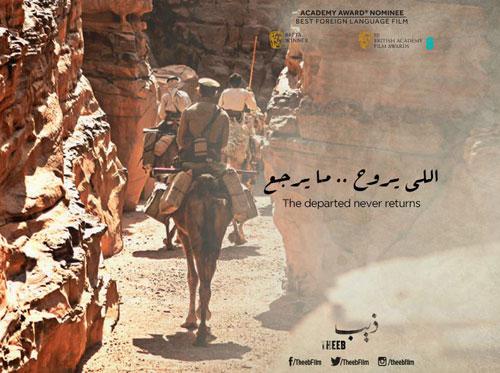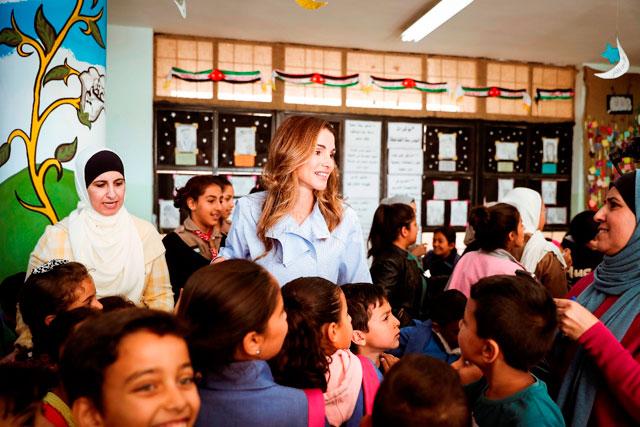You are here
Documentary follows students’ quest to improve their school, community
By Hind Joucka - Oct 22,2015 - Last updated at Oct 22,2015

A still from Jordanian documentary ‘Al Majlis’ (Photo courtesy of ME Films)
AMMAN — Full of hope and inspiration, three students — Layan, Abdul Ghani and Omar — embark on a journey to improve their school and community in the Jordanian documentary “Al Majlis” or “The Council”.
Palestinian-Jordanian filmmaker Yahya Alabdallah’s latest film follows primary school pupils who decide to run in student council elections at their UNRWA-run school in the village of Al Sukhneh, Zarqa.
Filmed throughout the scholastic year of 2012, the documentary was praised for its “realness and authenticity” at its first screening in Jordan by the Royal Film Commission on Monday at the Rainbow Theatre.
Alabdallah’s film explores various problems facing the free educational systems in Jordan and the Arab world, such as lack of appropriate resources, violence among students and low standards of education.
“I wanted to focus on these areas and point out the flaws of the public and free school systems, paying extra attention to the quality of education provided,” he said.
“The spread of illiteracy in these schools comes as a result of the large number of students in each class, the teachers’ inability to enforce discipline, and the inflexibility of the syllabus, which does not accommodate different ways of learning,” the director added.
After winning the student council elections, the three students face many hurdles created by “social rigidity” and “government inadequacies”, according to Alabdallah.
The primary school students’ determination leads them to take matters into their own hands and arrange a meeting with the town councillor in order to discuss the most pressing issues endangering the health and safety of the children at school.
Their priorities include stopping the physical and emotional bullying endemic in most classrooms, and giving students more opportunities for sports and exercise, such as by replacing the asphalt of their playground with green grass suitable for playing football.
“Sadly, when the kids got in touch with local community members outside the school, there was barely any response. The municipality made a lot of promises but none of them were carried out,” Alabdallah said.
The director, whose previous projects include the internationally acclaimed narrative feature “The Last Friday”, also wanted to demonstrate how gender segregation at school due to religious and social strictures becomes one of the main obstacles prohibiting students from achieving their full potential at school.
“A lot of incidents of violence could have been avoided if these schools were mixed-gender. Taboos instilled by society in these boys’ and girls’ minds cause a lot of unnecessary fighting among boys as well as constraints for girls,” he told The Jordan Times.
Alabdallah credited his background as a teacher with helping him to make the students feel comfortable during the filming process and generate the authenticity for which the film was commended.
“As I am an Arabic teacher, I was able to build good relationships with all the kids involved in the film from the very beginning, which made them feel at ease speaking to me even in the presence of the camera. After a while they forgot about the camera and me following them and that’s how I got the scenes to be so genuine,” he said.
However, Alabdallah observed that by the end of the filming period, morale among the students was low due to the lack of improvement in their circumstances.
“After a year or so, I found out that Abdul Ghani left school and has been working as a shepherd. I was very shocked to hear that, because I was hoping for things to get better for him, as with Omar, who was granted a scholarship to study at the Jubilee School in Amman,” the director said.
The film won the “Final Cut” Award at the Venice International Film Festival in 2014 and has received a Special Mention at the Muhr Competition for feature-length films at the Dubai International Film Festival.
A portion of the film’s profits will be given to the student protagonists, according to Alabdallah.
Related Articles
AMMAN — The fifth edition of the Jordanian Film Days in Algeria are under way in Algiers, with three features on the screening list, accordi
AMMAN — Jordan this year continues to be a presence at the prestigious Dubai International Film Festival (DIFF), with seven films co-produce
AMMAN — Her Majesty Queen Rania on Tuesday made a surprise visit to the northern Rabahiya coeducational secondary school in Amman, where she



















